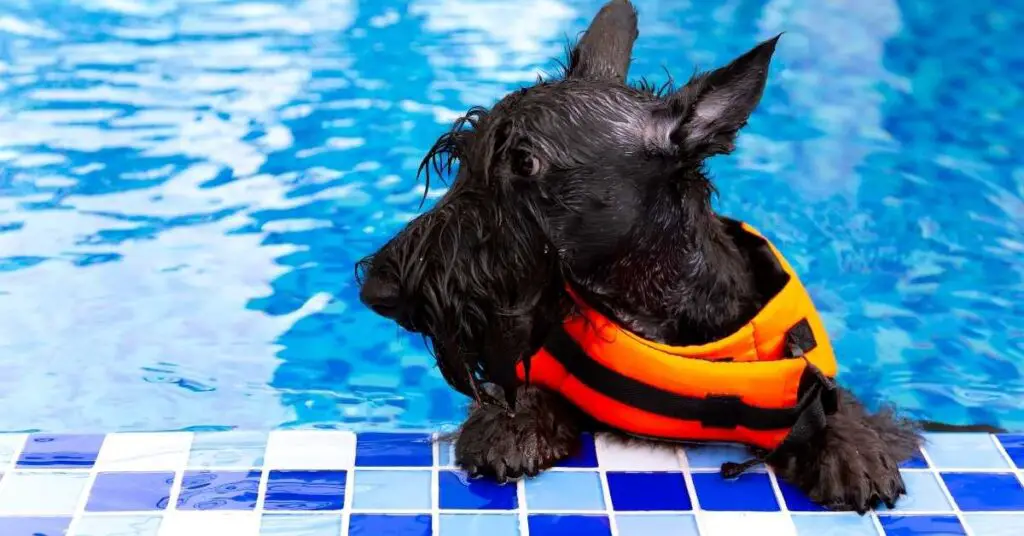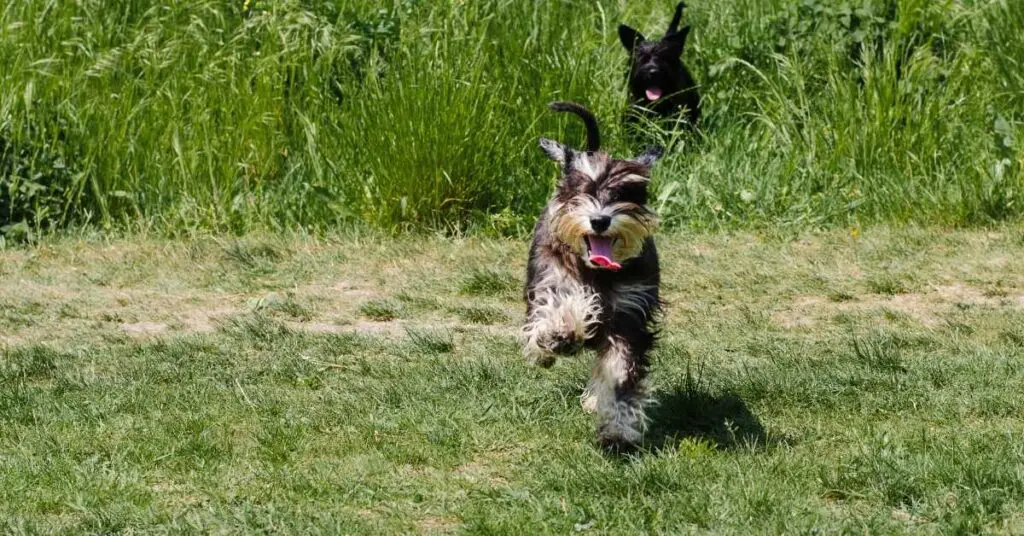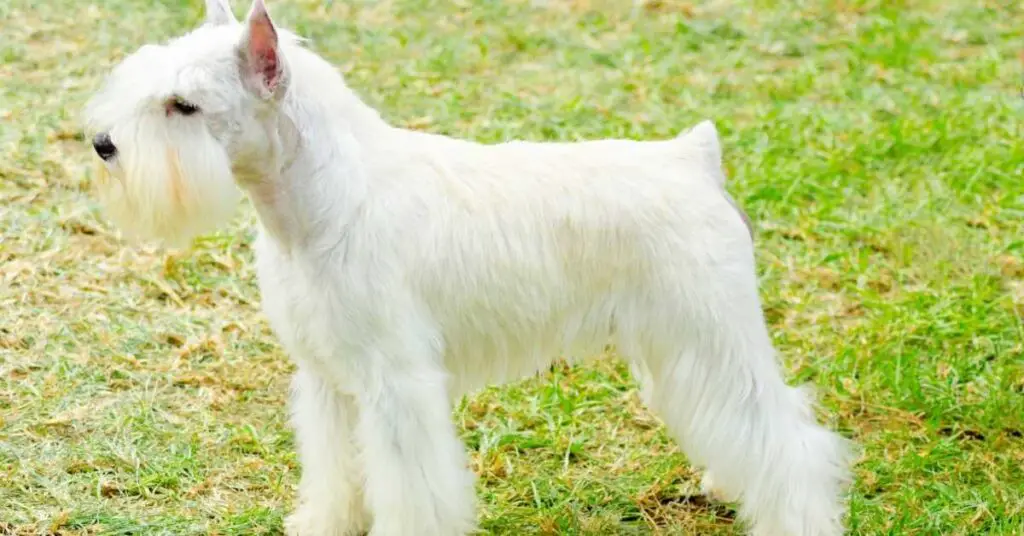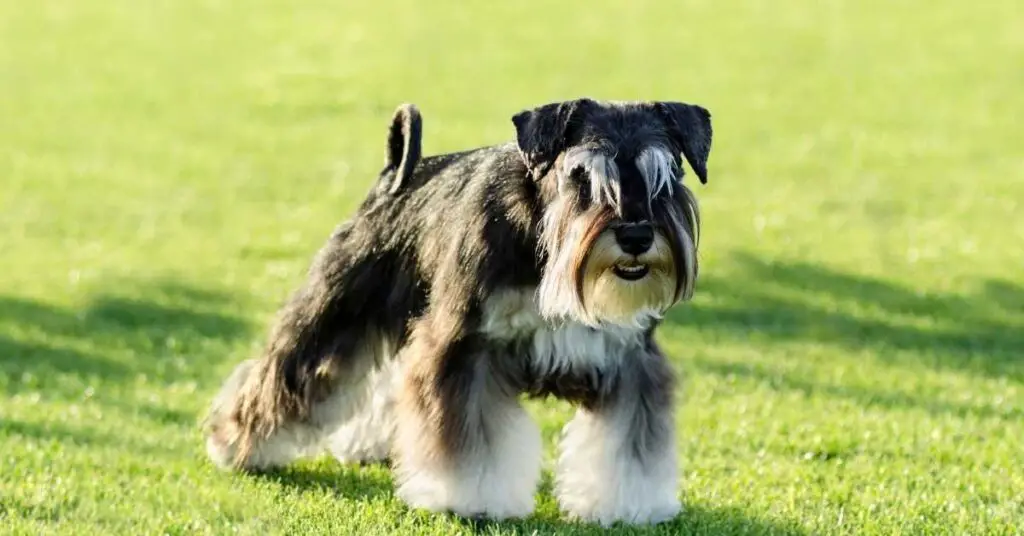Do you ever wonder if schnauzers can rock the captivating merle coat pattern? Well, prepare to be amazed!
In this article, we’ll explore the intriguing world of schnauzers and delve into the possibility of them sporting the stunning merle coat. As a schnauzer enthusiast, you’ve probably noticed the rise in popularity of the merle pattern. But can schnauzers join the merle club too?
Let’s unravel this mystery and discover if schnauzers can indeed be merle. Get ready to be captivated by their diversity and beauty!
Key Takeaways
- Merle schnauzers have a unique and beautiful coat pattern.
- Merle can be found in various dog breeds, not just schnauzers.
- Breeding merle to merle can increase the risk of certain health issues.
- Understanding coat color genetics and merle pattern genetics is crucial for producing healthy merle schnauzers.
Can Schnauzers Be Merle?
Yes, you can find merle schnauzers, which have a unique and beautiful coat pattern. Merle schnauzers are a popular choice for those seeking a dog with a striking appearance. However, it’s important to consider their temperament before making a decision.
Merle schnauzers, like their non-merle counterparts, are known for their intelligence, loyalty, and spirited nature. They’re generally friendly and affectionate with their families, making them great companions.
When it comes to grooming, merle schnauzers require regular maintenance to keep their coats looking their best. Their unique coat pattern may require additional attention, such as brushing and occasional grooming to remove any tangles or mats.
Training is also an essential aspect of owning a merle schnauzer. With their intelligence and eagerness to please, they can be easily trained with positive reinforcement methods. Consistency and patience are key to successfully training a merle schnauzer.
Merle schnauzers can make excellent family pets. They’re generally good with children and can adapt well to different living situations. However, it’s important to provide them with enough mental and physical stimulation to prevent boredom and potential behavioral issues.
In recent years, the popularity of merle schnauzers has been on the rise. Their striking coat pattern and unique appearance have captured the attention of many dog lovers. However, it’s crucial to remember that responsible ownership and proper care are essential for any dog, including merle schnauzers.

What Is Merle?
Merle is a coat pattern characterized by patches of color on a lighter base color, resulting in a mottled or marbled appearance. It’s a fascinating genetic trait that can be found in various dog breeds, including schnauzers. Here are some key points to help you understand what merle is all about:
- Merle genetics: The merle coat pattern is caused by a dominant gene known as the merle gene. When a dog has one copy of this gene, it will display the merle pattern, while two copies can result in a double merle, which may have more severe health issues.
- Merle in other dog breeds: Although commonly associated with Australian Shepherds, merle can be found in many other breeds, such as Collies, Dachshunds, Chihuahuas, and even Great Danes. Each breed may have its own unique variations of the merle pattern.
- Merle coat variations: Merle patterns can vary widely, ranging from light blue or gray patches on a white or cream base to darker patches on a black or liver base. The size, shape, and intensity of the patches can also differ between individuals.
- Merle health concerns and breeding controversies: Breeding merle to merle can increase the risk of certain health issues, such as deafness, blindness, and skin problems. This has led to debates and controversies surrounding the responsible breeding of merle dogs.
Understanding the intricacies of merle genetics, its presence in various dog breeds, the different coat variations, and the associated health concerns and breeding controversies can help you appreciate and navigate the world of merle dogs.
Schnauzer Coat Colors and Patterns
When it comes to schnauzers, you’ll find a variety of coat colors and patterns that can make them even more unique and charming. Schnauzer coat colors and patterns are determined by their genetics. The merle gene is responsible for the merle color variations seen in schnauzers. This gene causes a dilution of the base coat color, resulting in a marbled or mottled appearance. The merle pattern can come in different shades, including blue merle, red merle, and chocolate merle.
In addition to their striking appearance, merle schnauzers also have unique temperaments. They’re known to be intelligent, loyal, and energetic. They’re generally friendly and get along well with other pets and children. However, it’s essential to note that individual temperaments can vary, and proper training and socialization are still crucial for any dog, including merle schnauzers.
The popularity of merle schnauzers has been on the rise in recent years. Their distinctive coat patterns and colors have captured the hearts of many dog lovers. However, it’s important to remember that responsible breeding practices should be followed to ensure the health and well-being of these dogs. It’s also essential to find a reputable breeder who understands the genetics and potential health risks associated with merle schnauzers.
What Do Merle Schnauzers Look Like?
Take a look at the distinctive appearance of merle schnauzers. These unique dogs have a coat pattern characterized by patches of darker color on a lighter base color. Here are four key features that make merle schnauzers stand out:
- Coat: Merle schnauzers have a mesmerizing coat with a marbled or dappled effect. The patches of color can vary in size and shape, creating a striking and eye-catching appearance. The base color can be anything from white to silver or black.
- Temperament: Merle schnauzers are known for their friendly and affectionate nature. They’re often described as intelligent and loyal companions. They enjoy being part of a family and thrive on human companionship.
- Grooming needs: Like all schnauzers, merle schnauzers have a double coat that requires regular grooming. Their dense and wiry fur needs to be brushed regularly to prevent matting and tangling. Regular trimming and hand-stripping are also necessary to maintain their distinctive appearance.
- Training challenges: Merle schnauzers can sometimes exhibit stubbornness, which can present training challenges. They require consistent and patient training methods to ensure they understand and obey commands. Positive reinforcement techniques tend to work best with these intelligent dogs.
Merle schnauzers aren’t only beloved companions but also make excellent therapy dogs. Their friendly and calm demeanor makes them well-suited for providing emotional support to those in need. With their unique coat pattern and wonderful temperament, it’s no wonder that merle schnauzers have been growing in popularity and becoming a trend in the dog world.

Breeding Merle Schnauzers
If you’re considering breeding merle schnauzers, there are several important factors to take into account. Breeding ethics and responsible breeding practices should be at the forefront of your mind. It’s crucial to prioritize the health and well-being of the dogs involved in the breeding process. Genetic testing is essential to ensure that the parent dogs don’t carry any hereditary diseases or conditions that could be passed on to the offspring. Additionally, understanding coat color genetics and merle pattern genetics is crucial in producing healthy and desirable merle schnauzers.
When breeding merle schnauzers, it’s important to select parent dogs that have been genetically tested for common health issues and that have received a clean bill of health. This can help reduce the risk of passing on any genetic diseases to the puppies. It’s also important to understand the genetics behind merle pattern, as improper breeding can result in health problems such as deafness or eye abnormalities.
To responsibly breed merle schnauzers, it’s recommended to work with a reputable breeder who’s experience in breeding merle dogs. They can provide guidance on selecting suitable parent dogs and can ensure that proper genetic testing is carried out. By following these guidelines and prioritizing the health and well-being of the dogs, you can contribute to the production of healthy and desirable merle schnauzers.
Pros and Cons of Merle Schnauzers
While there are several advantages to owning a merle schnauzer, it’s important to consider the potential drawbacks as well. Here are some pros and cons of merle schnauzers to help you make an informed decision:
- Merle gene: The merle gene is responsible for the unique coat pattern in merle schnauzers. This gene creates a beautiful mosaic of colors and patterns, making your schnauzer stand out from the crowd.
- Genetic testing: Before breeding or buying a merle schnauzer, it’s crucial to conduct genetic testing. This will help identify any potential health issues associated with the merle gene, such as deafness or vision problems. Genetic testing ensures the health and wellbeing of your furry friend.
- Merle controversy: The merle gene has sparked some controversy in the dog breeding community. Critics argue that merle-to-merle breeding can lead to serious health issues in puppies. It’s important to be aware of this controversy and make responsible breeding decisions.
- Merle color variations: Merle schnauzers come in a wide range of color variations, including blue merle, red merle, and chocolate merle. These unique color patterns can be a major attraction for those seeking a one-of-a-kind companion.
Consider these pros and cons when deciding if a merle schnauzer is the right fit for you. Despite the controversy, merle schnauzers continue to gain popularity for their striking appearance and unique personality.
Health Considerations of Merle Schnauzers
When considering a merle Schnauzer, it’s important to be aware of the potential health risks associated with this coat pattern. Merle is a result of a genetic mutation that affects the pigmentation of the dog’s coat, skin, and eyes. While this unique pattern can be visually striking, it’s crucial to understand the health implications that may come with it.
One of the first steps in ensuring the health of a merle Schnauzer is genetic testing. Breeders should conduct thorough testing to identify any potential health issues that may be associated with the merle gene. This can help prevent the passing on of genetic disorders to future generations.
Responsible breeding practices are essential when it comes to merle Schnauzers. Breeders should prioritize the health and well-being of the dogs and avoid breeding merle to merle, as this can increase the risk of certain health conditions. It’s recommended to breed merle Schnauzers with non-merle individuals to maintain a healthy gene pool.
Caring for a merle Schnauzer requires regular veterinary check-ups and attention to their specific needs. Their eyes and skin should be monitored for any signs of issues, as merle dogs may be more prone to certain eye disorders and sun sensitivity.
While merle Schnauzers can participate in competitions, it’s important to note that some breed standards may not recognize them. It’s crucial to check the specific rules and regulations of the competition before entering a merle Schnauzer.
Finding a Merle Schnauzer Breeder
To find a merle Schnauzer breeder, start by researching reputable breeders in your area or online. Here are some important factors to consider when searching for a merle Schnauzer breeder:
- Merle Schnauzer availability: Not all breeders may have merle Schnauzers available, as the merle color pattern is less common than other variations. Look for breeders who specialize in merle Schnauzers or have a history of breeding this specific color.
- Merle Schnauzer temperament: It’s crucial to find a breeder who prioritizes the temperament of their dogs. Merle Schnauzers should be well-socialized, friendly, and have a stable temperament. Ask the breeder about the temperament of their breeding dogs and request to meet the puppies’ parents if possible.
- Merle Schnauzer price: Merle Schnauzers can be more expensive than other coat colors due to their rarity. Research the average price range for merle Schnauzers and be cautious of breeders charging significantly higher or lower prices. Remember, a higher price doesn’t always guarantee quality.
- Merle Schnauzer coat care: Merle Schnauzers require regular grooming to maintain their beautiful coat. Look for a breeder who emphasizes coat care and can provide guidance on grooming routines, including brushing, trimming, and bathing.
Finding a reputable merle Schnauzer breeder may take time and effort, but it’s essential for ensuring the health and well-being of your future pet. By following these guidelines, you can find a breeder who offers merle Schnauzers with excellent temperament, reasonable pricing, and a commitment to coat care.
Frequently Asked Questions
Are Merle Schnauzers More Prone to Health Issues?
Merle schnauzers, like any merle-colored dogs, can have a higher risk of health issues due to the color genetics involved. Breeding guidelines recommend avoiding merle-to-merle breeding to minimize potential health risks. However, merle remains a popular and visually striking coat variation in schnauzers.
Can Merle Schnauzers Have Blue Eyes?
Yes, merle schnauzers can have blue eyes. However, it is important to be aware of the potential health risks associated with this coat pattern. Additionally, the cost and eligibility for dog shows may vary, as well as potential temperament differences.
Are Merle Schnauzers More Expensive Than Other Schnauzers?
Merle schnauzers are often more expensive due to their popularity and unique coat variations. Breeders should prioritize genetic testing to ensure healthy puppies. However, controversies surrounding merle schnauzer colors exist, so research is vital.
Can Merle Schnauzers Be Shown in Dog Shows?
Yes, merle schnauzers can be shown in dog shows. However, there may be restrictions due to the merle gene inheritance and potential health concerns. The popularity of merle schnauzers has led to more breeding restrictions.
Do Merle Schnauzers Have a Different Temperament Than Other Schnauzers?
Merle schnauzers may exhibit temperament differences compared to other schnauzers due to their unique genetic makeup. Additionally, they can have different eye color possibilities. However, it’s important to be aware of potential genetic health risks and possible price differences. Finally, merle schnauzers may not be eligible for dog shows.
Conclusion
In conclusion, while merle is a popular coat pattern among various dog breeds, it isn’t naturally found in schnauzers. The genetic factors and characteristics of schnauzers don’t typically allow for the expression of the mesmerizing merle pattern.
Breeding for merle schnauzers may involve certain risks and health considerations. It’s important to carefully research and choose a reputable breeder if you’re interested in acquiring a merle schnauzer.






